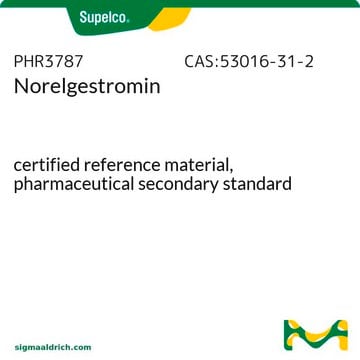All Photos(1)
About This Item
Linear Formula:
CH3CO2(CH2)11CH3
CAS Number:
Molecular Weight:
228.37
EC Number:
MDL number:
UNSPSC Code:
12352100
PubChem Substance ID:
NACRES:
NA.22
Recommended Products
Quality Level
Assay
97%
form
liquid
refractive index
n20/D 1.432 (lit.)
bp
150 °C/15 mmHg (lit.)
density
0.865 g/mL at 25 °C (lit.)
SMILES string
CCCCCCCCCCCCOC(C)=O
InChI
1S/C14H28O2/c1-3-4-5-6-7-8-9-10-11-12-13-16-14(2)15/h3-13H2,1-2H3
InChI key
VZWGRQBCURJOMT-UHFFFAOYSA-N
Looking for similar products? Visit Product Comparison Guide
Hazard Statements
Hazard Classifications
Aquatic Chronic 4
Storage Class Code
10 - Combustible liquids
WGK
WGK 2
Flash Point(F)
235.4 °F - closed cup
Flash Point(C)
113 °C - closed cup
Choose from one of the most recent versions:
Already Own This Product?
Find documentation for the products that you have recently purchased in the Document Library.
Ido Yosha et al.
Journal of agricultural and food chemistry, 56(17), 8045-8049 (2008-08-12)
Alginate-gelatin beads with dispersed droplets of a model pheromone, dodecyl acetate, were prepared as a vehicle for slow release of pheromones into the atmosphere over a prolonged period of time. The beads are prepared in two steps, the first being
Developing new anti-cancer drugs.
Ricardo de Souza Pereira
Recent patents on anti-cancer drug discovery, 6(1), 1-5 (2010-11-30)
K D Philipson et al.
The American journal of physiology, 248(1 Pt 2), H147-H150 (1985-01-01)
We have used charged amphiphiles as phospholipid analogues to modulate the interaction of Ca2+ with myocardial sarcolemma. The amphiphiles were dodecyl sulfate, dodecyltrimethylamine, and lauryl acetate; these are anionic, cationic, and neutral molecules, respectively. The hydrophobic alkyl chain is identical
Stephen J Martin et al.
Journal of chemical ecology, 36(8), 855-863 (2010-05-29)
Semiochemicals influence many aspects of insect behavior, including interactions between parasites and their hosts. We studied the chemical recognition system of bumblebees (Bombus) by examining the cuticular hydrocarbon cues of 14 species, including five species of social parasites, known as
Brent L Waguespack et al.
Journal of chromatography. A, 1078(1-2), 171-180 (2005-07-13)
A variety of porous polymer monoliths (PPMs) have been synthesized using the 'conduct-as-cast' format. The resulting polymers have been evaluated for use as separation media in capillary electrochromatography (CEC). The results have shown that substituting a small percentage of the
Our team of scientists has experience in all areas of research including Life Science, Material Science, Chemical Synthesis, Chromatography, Analytical and many others.
Contact Technical Service








